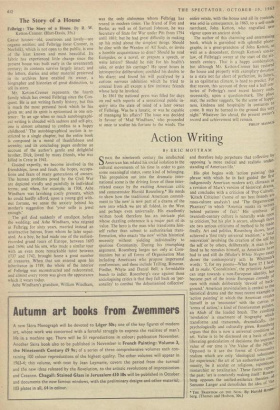The Story of a House
Felbrigg : The Story of a House. By R. W. Ketton-Cremer. (Hart-Davis, 35s.) GREAT houses—old, courteous and lovely—are organic entities; and Felbrigg (near Cromer, in Norfolk), which is not open to the public, is one of the least known and most beautiful. Its fabric has experienced little change since the present house was built early in the seventeenth century; its contents survive largely intact; and the letters, diaries and other material preserved
in its archives have enabled its owner, a biographer and historian of great distinction, to tell its story.
Mr. Ketton-Cremer represents the fourth family which has owned Felbrigg since the Con- quest. He is not writing family history, but this is much the most personal book which he has given us; and its spirit is epitomised in one sen- tence: 'In an age when so much autobiographi-
cal writing is clouded with sadness and self-pity, one is almost ashamed to confess to a happy childhood.' The autobiographical section is re-
stricted to a single chapter, but the entire book is composed in a mood of thankfulness and serenity; and its concluding pages enshrine an account of the author's gentle and delightful brother, Dick, loved by many friends, who was killed in Crete in 1941.
Guided expertly, we become involved in the friendships, loves and feuds, the hopes, occupa- tions and fears of many generations of owners.
The human problems posed by the Civil War are depicted vividly and painfully in individual terms; and when, for example, in 1708, Ashe
Windham was lavishing costly presents, which he could hardly afford, upon a young girl with-
out fortune, we sense the anxiety behind his mother's suggestion that 'your selfe is jewel enough.'
The girl died suddenly of smallpox before the wedding; and Ashe Windham, who reigned at Felbrigg for sixty years, married instead an unattractive heiress, from whom he later separ- ated. As a boy, he had made one of the earliest- recorded grand tours of Europe, between 1693
and 1696; and his son, who made a similar tour with an even more remarkable tutor between 1737 and 1742, brought home a great number of treasures. When that son entered upon his inheritance in 1749, the whole of the interior of Felbrigg was reconstructed and redecorated, and almost every room was given the appearance which it wears today.
Ashe Windham's grandson, William Windham, was the only statesman whom Felbrigg has reared in modern times. The friend of Fox and Burke, as well as of Samuel Johnson, he was Secretary of State for War under Pitt from 1794 until 1801; but he had great difficulty in making up his mind about the simplest things. Should he dine with the Warden of All Souls, or invite a humble acquaintance to dine? Should he read Euripides, or a novel, or prepare a speech, or write letters? Should he ride for his health's sake, or order his carriage? He spent hours in introspective deliberation; confided his doubts to his diary; and found his will paralysed by a curious nervous inhibition which he tried to conceal from all except a few intimate friends whose help he invoked.
In 1861 the national press was filled for days on end with reports of a sensational public in- quiry into the state of mind of a later owner of Felbrigg. Was he a lunatic, or was he capable of managing his affairs? The issue was decided in favour of 'Mad Windham,' who proceeded at once to scatter his fortune to the winds. The
entire estate, with the house and all its contents, was sold in consequence, in 1863, to a self-made merchant, John Ketton, who engrafted new vigour upon an ancient stock. The author of this charming and entertaining book, which is garnished with splendid photo- graphs, is a great-grandson of John Ketton, as well as a descendant, through Ketton's law, of Felbrigg's owner at the start of the six- teenth century. That is a happy combination, but although Mr. Ketton-Cremer has restored the house and property with exemplary devotion to a state not far short of perfection, its future, in an egalitarian climate, is hard to predict. For that reason, this account of three and a half cen- turies of Felbrigg's most recent history ends, necessarily, upon a question-mark. The place may, the author suggests, 'be the scene of happi- ness, kindness and hospitality in centuries to come. It may be burned to the ground this very night.' Whatever lies ahead, the present owner record and achievement will remain.
PHILIP MAGNUS














































 Previous page
Previous page